Glen Lee, Chief Financial Officer
District of Columbia (Washington, DC)
District of Columbia (Washington, DC)
Learn about the latest News & Events for District of Columbia (Washington, DC), and sign up to receive news updates.
Add this issuer to your watchlist to get alerts about important updates.
Learn about the latest News & Events for District of Columbia (Washington, DC), and sign up to receive news updates.
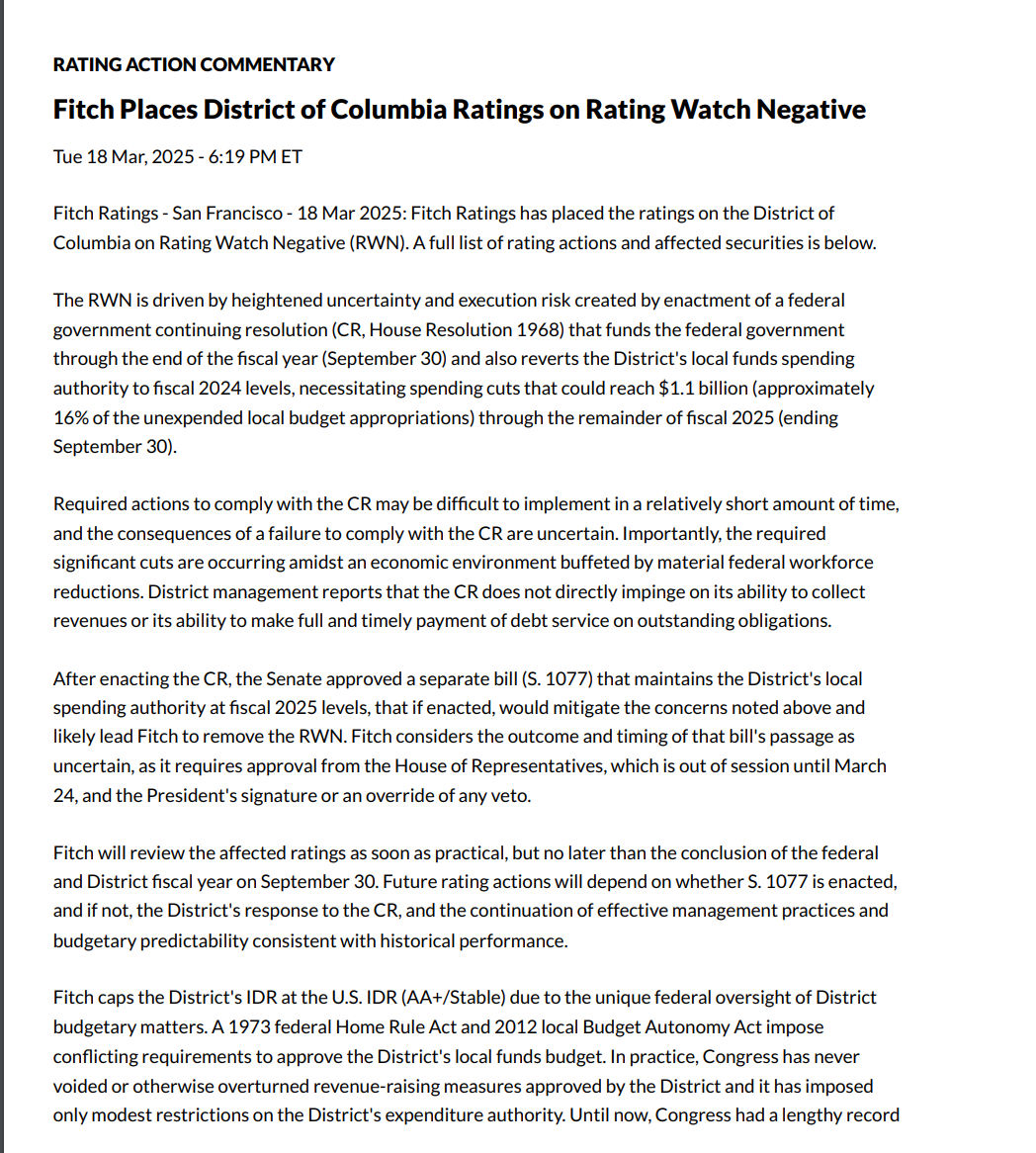
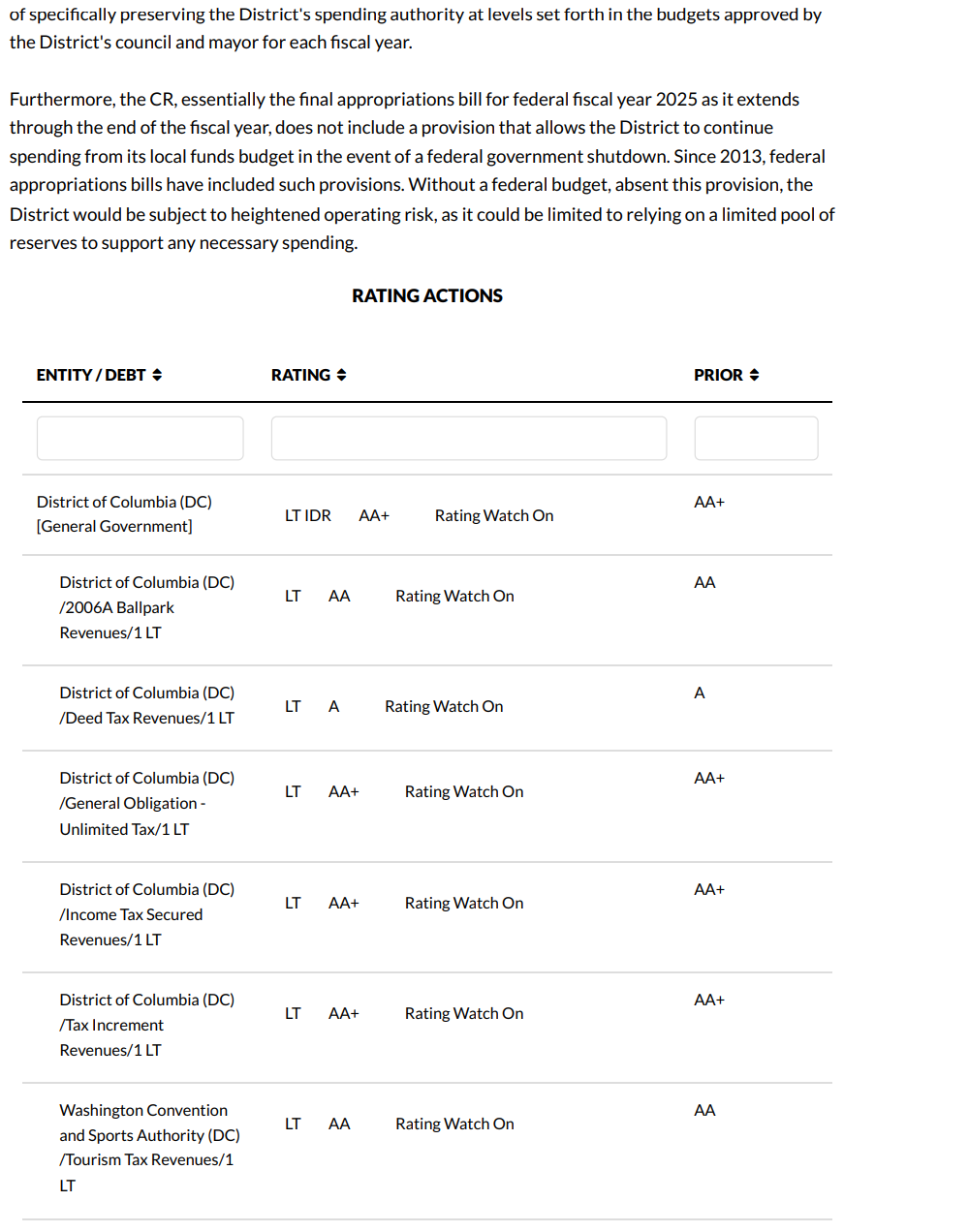
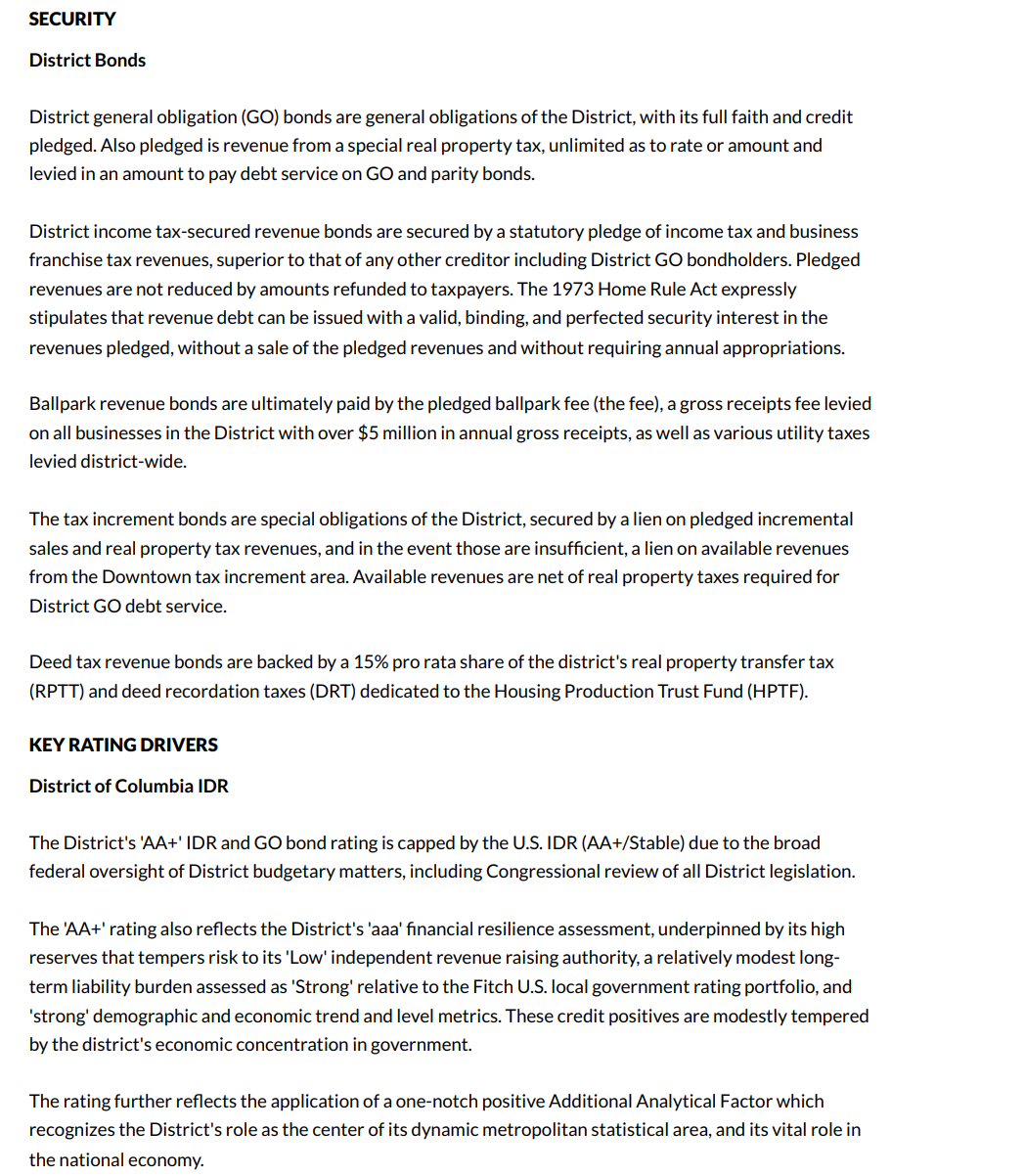
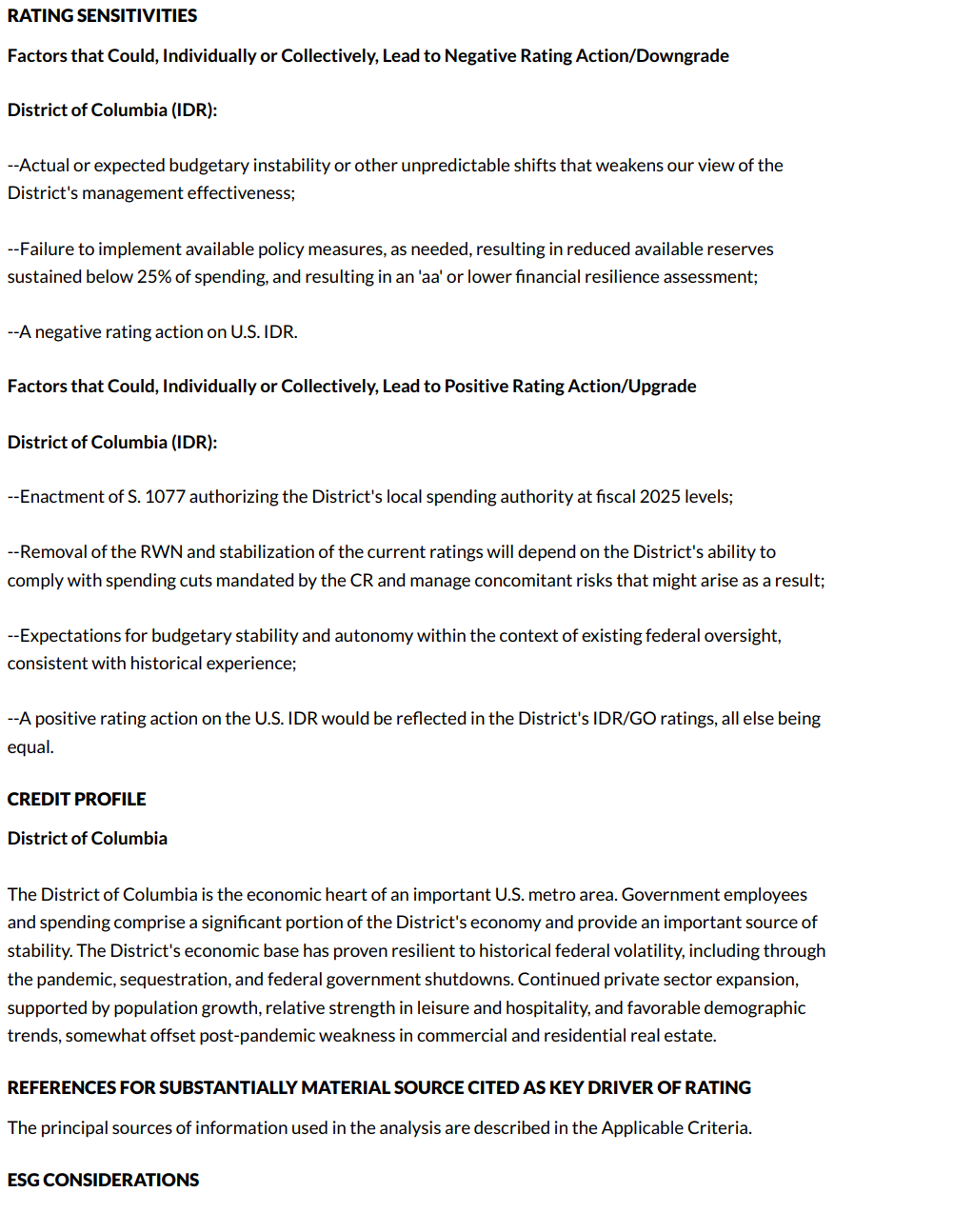
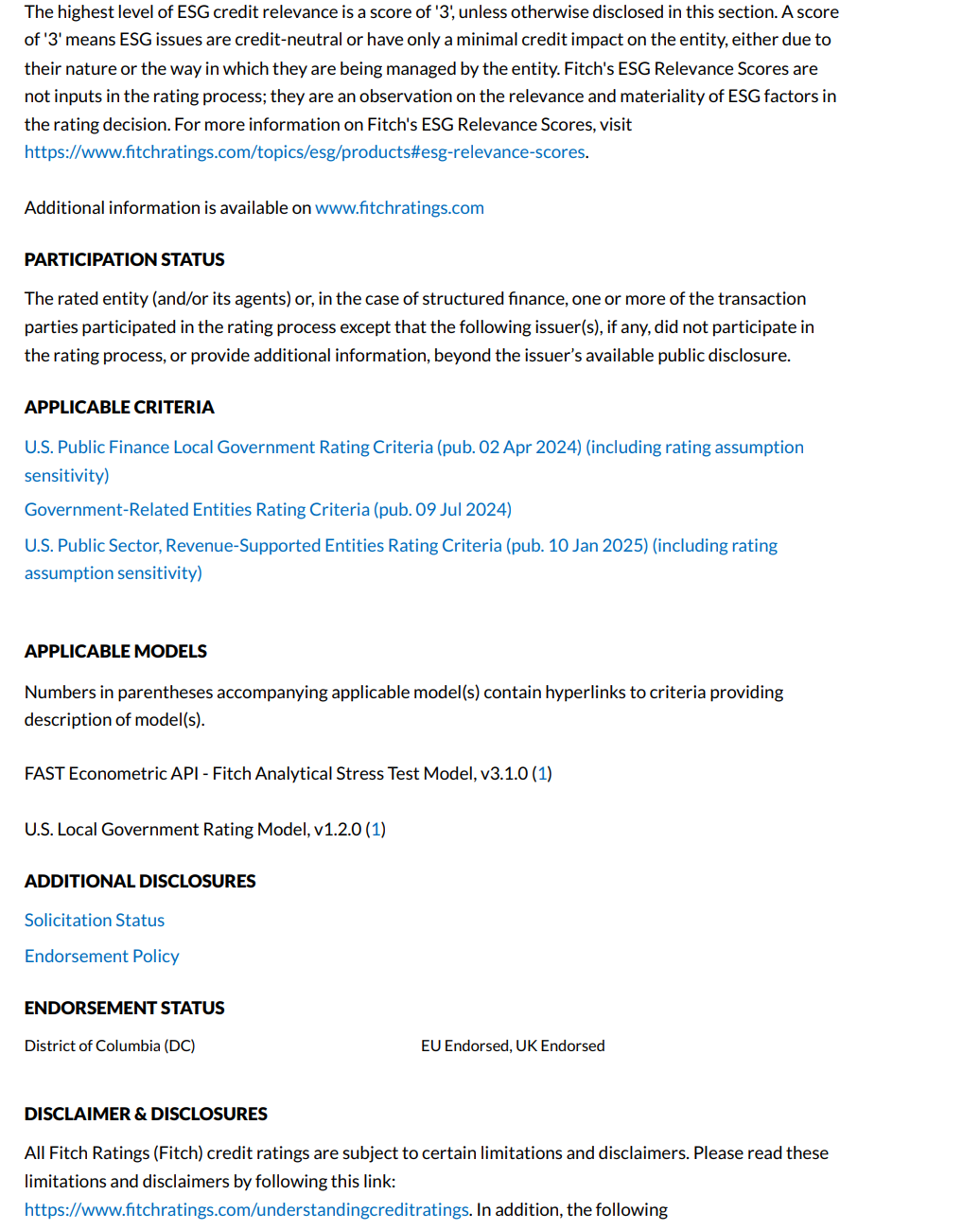
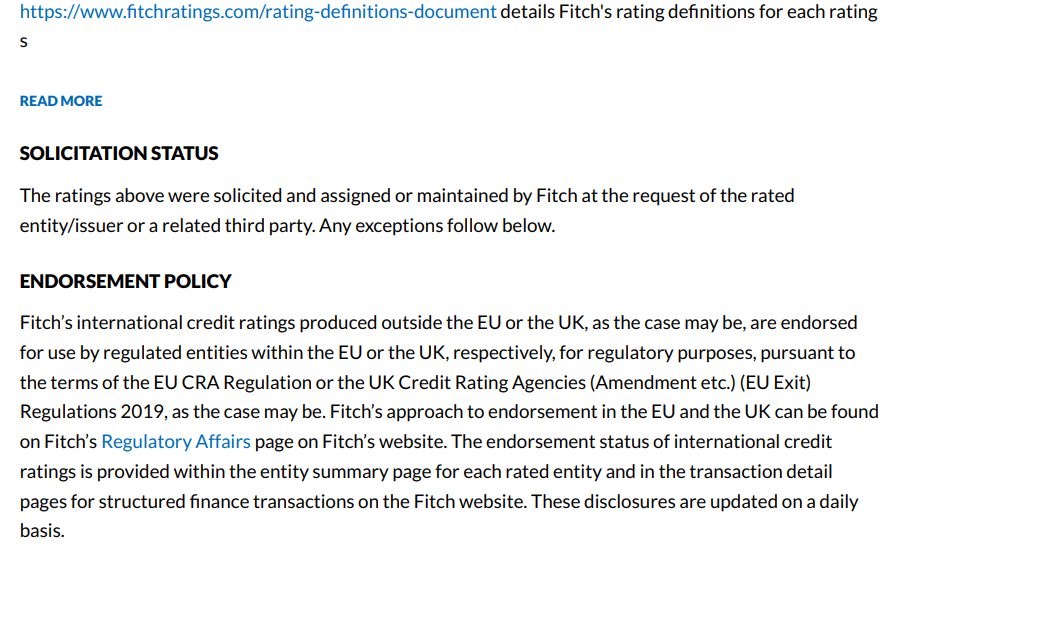
CFO Glen Lee's Message on Moody's Rating Review:
Today, Moody's Ratings announced that it has placed the District of Columbia’s credit ratings under review for a possible downgrade; another outcome of the federal workforce reductions and shifts in the real property markets. The District’s most recent revenue estimate reflected the impact of these two fundamental changes in the local economy. No rating decision has been made at this time by Moody’s.
We will continue to exercise fiscal prudence and sound financial management practices in collaboration with the elected leadership to ensure the District’s financial health and sustainability.
Read the letter from the CFO to the Mayor and Council Chairman regarding the February 2025 quarterly revenue estimates.
The District of Columbia Annual Comprehensive Financial Report presented below is for the year ending September 30, 2024.
Read the letter from the CFO to the Mayor and Council Chairman regarding the December 2024 quarterly revenue estimates.
The Office of the Chief Financial Officer has released its 2024 Long-Range Capital Financial Plan Report. The report looks at the District's current assets, their condition, future capital needs, and funding availability to develop a long-range plan to address all identified capital needs of the District in the shortest possible time period.
(Washington, D.C.) - Chief Financial Officer Glen Lee announced today that Moody’s Ratings (Moody’s) upgraded the ratings of several special tax bonds of the District of Columbia. These upgrades reflect the strength and resilience of the District’s revenue streams. The outlook on all of the District’s special tax bonds is negative due to the negative outlook Moody’s maintains on the sovereign rating of the U.S. government.
Moody’s has upgraded the following ratings:
“Moody’s upgrades are a testament to the District's solid financial management and strong economic fundamentals,” said Chief Financial Officer Glen Lee. “We are extremely pleased by this recognition of the District’s strong governance and financial strength. We will continue to work with the District’s elected leaders to maintain the District’s financial health and stability and safeguard the interests of the city’s residents and stakeholders.”
These upgrades, which were a result of reviews initiated on July 24, 2024, following the release of the new US States and Territories methodology, underscore the District’s ability to maintain strong coverage of debt service obligations, supported by a diverse and robust economic base.
Read the letter from the CFO to the Mayor and Council Chairman regarding the September 2024 quarterly revenue estimates.
On Tuesday September 10, 2024, the Office of the Chief Financial Officer, Office of Finance and Treasury, successfully priced its General Obligation Bonds, Series 2024ABC (the “Bonds”), which, to date, is the District’s largest ever bond transaction, totaling nearly $1.59 billion. The Bonds are rated Aaa / AA+ / AA+ by Moody’s, Standard & Poor’s, and Fitch, respectively.
The proceeds of the Bonds will be utilized to pay or reimburse the District for capital project expenditures under the District’s capital improvements plan, to purchase for cancellation certain outstanding bonds of the District pursuant to a tender offer for debt service savings, and to refund certain outstanding bonds of the District that were issued as Build America Bonds, as well as to pay the costs and expenses associated with issuing the Bonds.
The Bonds were issued with an aggregate, all-in true interest cost of 3.43%, and the refunding components of the transaction resulted in gross debt service savings of roughly $50.7 million.
The syndicate for the issuance was led by Siebert Williams Shank & Co., LLC. Other members of the underwriting syndicate included Jefferies as co-senior manager, as well as Morgan Stanley, Ramirez & Co., Inc., Raymond James, Academy Securities, Inc., Huntington Capital Markets, and Mesirow Financial, Inc. as co-managers.
Read the attached Voluntary Notice of Potential Tender Offer and/or Refunding And New Money Transactions.
FY2025 Approved Budget - Volume 1 (Executive Summary)
FY2025 Approved Budget - Volume 2 (Agency Budget Chapters - Part 1)
FY2025 Approved Budget - Volume 3 (Agency Budget Chapters - Part 2)
FY2025 Approved Budget - Volume 4 (Agency Budget Chapters - Part 3)
FY2025 Approved Budget - Volume 5 (FY 2025-2030 Capital Improvements Plan)
Read the letter from the CFO to the Mayor and Council Chairman regarding the June 2024 quarterly revenue estimates.
Read the letter from the CFO to the Mayor and Council Chairman regarding the February 2024 quarterly revenue estimates.
The District of Columbia Annual Comprehensive Financial Report presented below is for the year ending September 30, 2023.
Read the letter from the CFO to the Mayor and Council Chairman regarding the December 2023 quarterly revenue estimates.
(Washington, DC) - Today, Moody’s Investors Service affirmed the District of Columbia’s Aaa rating. The Moody’s rating reflects “the District's overall financial, economic and governance strength.” According to Moody’s, “The District's high-wage knowledge and services-based economy will continue to expand and is positioned for future growth because employers are attracted to the District’s highly educated workforce. The District has exemplary fiscal governance. The District has among the lowest pension liabilities of any large city and has prefunded its other postretirement benefits (OPEB) liability, which affords it significant financial flexibility.” Moody’s also stated that the “District of Columbia, the nation's capital, is small but wealthy. Its population is smaller than all but two states, but its per capita income is higher than all 50 states and its GDP is greater than 17 states.”
However, despite this affirmation, Moody’s revised the District’s outlook from stable to negative “following the November 10 revision of the government of the United States of America’s outlook to negative from stable.” Moody’s based the District’s revision on its “economic, financial, capital market and governance linkages to the federal government.”
“The affirmation of the Aaa rating is an indication that the District’s finances remain strong,” said Chief Financial Officer Glen Lee. “The change in outlook has no bearing on the District’s fiscal strength and governance but is solely related to the unique relationship between the federal government and the District. I remain confident in the District’s ability to successfully manage its financial responsibilities.”
The negative outlook would likely remain for the next 12 to 18 months.
The Office of the Chief Financial Officer has released its 2023 Long-Range Capital Financial Plan Report. The report looks at the District's current assets, their condition, future capital needs, and funding availability to develop a long-range plan to address all identified capital needs of the District in the shortest possible time period.
The District of Columbia (the “District”) is evaluating the potential issuance of one or more
tax-exempt and/or taxable series of Income Tax Secured Revenue and Revenue Refunding Bonds (the “Bonds”), at one or more times, through a negotiated sale on or around November 15, 2023* through a syndicate led by Citigroup Global Markets Inc.
Please view the document below for additonal information.
Read the letter from the CFO to the Mayor and Council Chairman regarding the September 2023 quarterly revenue estimates.
Read the letter from the CFO to the Mayor and Council Chairman regarding the June 2023 quarterly revenue estimates.
Read the letter from the CFO to the Mayor and Council Chairman regarding the February 2023 quarterly revenue estimates.
The District of Columbia Annual Comprehensive Financial Report presented below is for the year ending September 30, 2022.
Read the letter from the CFO to the Mayor and Council Chairman regarding the December 2022 quarterly revenue estimates.
The Office of the Chief Financial Officer has released its 2022 Long-Range Capital Financial Plan Report. The report looks at the District's current assets, their condition, future capital needs, and funding availability to develop a long-range plan to address all identified capital needs of the District in the shortest possible time period.
Read the letter from the CFO to the Mayor and Council Chairman regarding the September 2022 quarterly revenue estimates.
FY 2023 Approved Budget - Volume 1 (Executive Summary)
FY 2023 Approved Budget - Volume 2 (Agency Budget Chapters - Part 1)
FY 2023 Approved Budget - Volume 3 (Agency Budget Chapters - Part 2)
FY 2023 Approved Budget - Volume 4 (Agency Budget Chapters - Part 3)
FY 2023 Approved Budget - Volume 5 (FY 2023-2028 Capital Improvements Plan)
Read the letter from the CFO to the Mayor and Council Chairman regarding the June 2022 quarterly revenue estimates.
Mayor Muriel Bowser announced the appointment of Glen Lee as the new Chief Financial Officer (CFO) for the District of Columbia. Please use the link below to read the press release.
The Office of the Chief Financial Officer’s Office of Revenue Analysis (ORA) has created a new, comprehensive website that houses all of the various economic and revenue analyses produced by the office for the District of Columbia. ORA’s new website includes all of their various economic and revenue reports, tax rates, economic indicators, various publications, and fiscal impact statements, as well as ORA’s blog, previously called District, Measured.
FY 2023 Proposed Budget - Volume 1 (Executive Summary)
FY 2023 Proposed Budget - Volume 2 (Agency Budget Chapters - Part 1)
FY 2023 Proposed Budget - Volume 3 (Agency Budget Chapters - Part 2)
FY 2023 Proposed Budget - Volume 4 (Agency Budget Chapters - Part 3)
FY 2023 Proposed Budget - Volume 5 (FY 2023-2028 Capital Improvements Plan)
Read the letter from the CFO to the Mayor and Council Chairman regarding the Febraury 2022 quarterly revenue estimates.
The District of Columbia Annual Comprehensive Financial Report presented below is for the year ending September 30, 2021.
Read the letter from the CFO to the Mayor and Council Chairman regarding the December 2021 quarterly revenue estimates.
(WASHINGTON, DC) –Today, as Mayor Muriel Bowser announced her appointment of Fitzroy Lee as the Chief Financial Officer, the Mayor released the following statement:
“Fitzroy Lee has served the residents of the District of Columbia for 20 years in the Office of the Chief Financial Officer, and he has been an integral part of the District’s financial resurgence. Mr. Lee dutifully stepped up to the lead the Office of the Chief Financial Officer earlier this year, and he selflessly has agreed to continue on in the role for the remainder of the term while the search for the permanent CFO continues. I am proud that he has committed to lead the agency at this critical juncture in the District’s history. We appreciate and applaud Mr. Lee’s continued service to the residents of the District of Columbia, and I call upon the Council to consider and swiftly confirm his appointment as we all work together to usher in our recovery, overcome our toughest challenges,and ensure every Washingtonian has a fair shot.”
Read the letter from the CFO to the Mayor and Council Chairman regarding the September 2021 quarterly revenue estimates.
The FY 2022 proposed budget and financial plan can be viewed here:
FY 2022 Proposed Budget - Volume 1 (Executive Summary)
FY 2022 Proposed Budget - Volume 2 (Agency Budget Chapters - Part 1)
FY 2022 Proposed Budget - Volume 3 (Agency Budget Chapters - Part 2)
FY 2022 Proposed Budget - Volume 4 (Agency Budget Chapters - Part 3)
FY 2022 Proposed Budget - Volume 5 (FY 2022-2027 Capital Improvements Plan)
Read the letter from the CFO to the Mayor and Council Chairman regarding the May 2021 quarterly revenue estimates.
Following the resignation of CFO Jeffrey S. DeWitt, Mayor Bowser has appointed Dr. Fitzroy Lee, Deputy Chief Financial Officer for the Office of Revenue Analysis, as the Interim Chief Financial Officer, effective upon the March 10, 2021 departure of CFO DeWitt. Read CFO DeWitt’s letter announcing Dr. Lee’s appointment here:
Read the letter from the CFO to the Mayor and Council Chairman regarding the revised revenue estimates.
DC Mayor Muriel E. Bowser on Friday announced that the District will enter phase 2 of reopening on Monday (June 22nd), bringing the nation’s capital in line with other jurisdictions in the region that have further relaxed pandemic restrictions. Bowser said the city has met benchmarks it set for entering the next phase of reopening, including a decline in community spread of the virus.
A copy of the full report can be found on the District's COVID-19 information website.
Monday, March 30, 2020
(Washington, DC) – Today, due to an increasing number of coronavirus (COVID-19) cases in Washington, DC and across the region and the nation, Mayor Muriel Bowser issued a stay-at-home order for the District of Columbia. This order reinforces the Mayor’s direction to residents to stay at home except to perform essential activities.
“Our message remains the same: stay home,” said Mayor Bowser. “Staying at home is the best way to flatten the curve and protect yourself, your family, and our entire community from COVID-19. Many people want to know how they can help right now, and for most people this is how – by staying home.”
The Mayor’s Order specifies that residents may only leave their residences to:
Any individual who willfully violates the stay-at-home order may be guilty of a misdemeanor and, upon conviction, subject to a fine not exceeding $5,000, imprisonment for not more than 90 days, or both.
The stay-at-home order goes into effect on April 1, 2020 at 12:01 am.
For more information on the District’s COVID-19 response and recovery efforts, visit coronavirus.dc.gov.
###
GOVERNMENT OF THE DISTRICT OF COLUMBIA
ADMINISTRATIVE ISSUANCE SYSTEM
Mayor’s Order 2020-054
March 30, 2020
SUBJECT: Stay at Home Order
ORIGINATING AGENCY: Office of the Mayor
By virtue of the authority vested in me as Mayor of the District of Columbia pursuant to section 422 of the District of Columbia Home Rule Act, approved December 24, 1973, Pub. L. 93-198, 87 Stat. 790, D.C. Official Code § 1-204.22 (2016 Repl.); in accordance with the COVID-19 Response Emergency Amendment Act of 2020, effective March 17, 2020, D.C. Act 23-247, and any substantially similar subsequent emergency or temporary legislation; section 5 of the District of Columbia Public Emergency Act of 1980, effective March 5, 1981, D.C. Law 3-149, D.C. Official Code § 7-2304 (2018 Repl.); section 5a of the District of Columbia Public Emergency Act of 1980, effective October 17, 2002, D.C. Law 14-194, D.C. Official Code § 7-2304.01 (2018 Repl.); and section 1 of An Act To Authorize the Commissioners of the District of Columbia to make regulations to prevent and control the spread of communicable and preventable diseases, approved August 11, 1939, 53 Stat. 1408, D.C. Official Code §§ 7-131 et seq. (2012 Repl.), it is hereby ORDERED that:
I. BACKGROUND
1. This Order is issued based on the increasing number of confirmed cases of COVID-19 within Washington, DC, and throughout the metropolitan Washington region. Scientific evidence and public health practices show that the most effective approach to slowing the community transmission of communicable diseases like COVID-19 is through social distancing. The age and health of a significant portion of the population of Washington, DC, places thousands of residents at risk for serious health complications, including death, from COVID-19.
2. Due to the outbreak of the COVID-19 virus, Mayor’s Order 2020-045, dated March 11, 2020, and Mayor’s Order 2020-046, dated March 11, 2020 issued declarations of a public emergency and public health emergency. Mayor’s Order 2020-050, dated March 20, 2020, extended those declarations of a public emergency and public health emergency through April 24, 2020. Mayor’s Order 2020-048, dated March 16, 2020, Mayor’s Order 2020-051, dated March 20, 2020, Mayor’s Order 2020-053, dated March 24, 2020, and several directives from the Department of Health provided for additional steps required to protect public health. The COVID-19 Emergency Response Amendment Act of 2020 (D.C. Act 23-247), which was approved by the Council and the Mayor on March 17, 2020, empower the District government with additional tools to address COVID-19. In addition, the President declared a national emergency on March 13, 2020, and the World Health Organization on March 11, 2020, characterized COVID-19 as a pandemic.
3. The findings of prior COVID-19 Mayor’s Orders are incorporated here by reference.
4. Because of the risk of the rapid spread of the virus, and the need to protect all members of Washington, DC, and the region, especially residents most vulnerable to suffering the prolonged illness or death from the virus, and local health care providers and first responders, this Order requires all individuals anywhere in Washington, DC, to stay in their residences except to perform essential activities, engage in essential business, provide or obtain essential government services, or engage certain authorized recreational activities not involving close contact with other persons.
5. The intent of this Order is to:
a. Keep the maximum number of people in their residences to the maximum extent feasible, consistent with protecting their own health and the health of others, while enabling essential activities, government services, and business to continue;
b. Significantly slow the spread of COVID-19;
c. Reduce COVID-19 virus infections, COVID-19 illness, and death caused by COVID-19 and its complications;
d. Protect the health, safety, and welfare of the residents of Washington, DC, and other individuals located in Washington, DC;
e. Allow essential activities, businesses, and government services to operate and be delivered in relative safety; and
f. To preserve a sphere of personal freedom by allowing outside recreational activities under conditions designed to minimize health risks.
II. ORDER TO STAY AT HOME
1. a. All individuals living in Washington, DC, are ordered to stay at their place of residence, except as specified in this Order.
b. Individuals experiencing homelessness are exempt from the provisions of section II.1.a., but are strongly urged to obtain shelter, and District agencies shall, and other public and private entities are strongly urged to, make such shelter available as soon as possible and to the extent practicable, and to use COVID-19 risk mitigation practices in their operations. The District’s 24-hour shelter hotline shall remain open and accessible at 202-399-7093.
2. Individuals may leave their residences (including their porches and yards) only to engage in Essential Activities including obtaining medical care that cannot be provided through telehealth and obtaining food and essential household goods; to perform or access Essential Governmental Functions; to work at Essential Businesses; to engage in Essential Travel; or engage in Allowable Recreational Activities, as defined in section IV of this Order.
3. Individuals shall not linger in common areas of apartment buildings and shall not use buildings’ facilities, such as gyms, party rooms, lounges, rooftop, or courtyard spaces. Such spaces are unlikely to be disinfected often and could otherwise exposed individuals to the COVID-19 virus.
4. Leaving home for the purposes of engaging in Essential Business Activities or the Minimum Business Operations of businesses not deemed Essential in Mayor’s Order 2020-053 is permissible, and persons are allowed to obtain and provide home-based services so long as the services do not involve physical touching and may be carried out in compliance with the Social Distancing Requirements, as defined in section IV.8 of this Order.
5. When engaging in Essential Travel, the following requirements and restrictions shall apply:
a. Individuals using public transportation to engage in Essential Travel must comply with the Social Distancing Requirements defined in subsection IV.8 of this Order, to the greatest extent feasible. Entry through the back door of any bus or van with a back door is encouraged for the protection of the drivers.
b. Drivers of ride-sharing vehicles engaged in Essential Travel must have disinfecting wipes in their vehicles and must wipe down all surfaces potentially touched by a passenger after each ride. Drivers of ride-sharing vehicles may not have more than two (2) other persons in their vehicle at any time.
c. Individuals using shared personal mobility devices such as scooters and bicycles are strongly encouraged to bring their own disinfecting wipes and wipe down the parts of the device they touch before and after riding.
d. Public and private transit officials shall make provisions for frequently disinfecting buses, subway cars, and any other vehicles they operate, to the highest feasible standards.
6.Under any of the limited circumstances in which an individual is allowed to leave their residence under this Order, the individual shall comply with the Social Distancing Requirements defined in section IV.8 of this Order, to the maximum extent possible.
7. Notwithstanding any other provision of this Order, an individual who is suspected or confirmed to be infected with COVID-19 or any other transmissible infectious disease shall not be outside their residence except as necessary to seek or receive medical care in accordance with guidance from public health officials or their health care provider.
III. OPERATION OF ESSENTIAL BUSINESSES & MINIMUM BUSINESS OPERATIONS
1. The provisions of Mayor’s Order 2020-053 regarding which businesses are essential; promoting telework; and allowing Minimum Business Operations of Non-Essential Businesses and subsequent guidance published on coronavirus.dc.gov remain in effect.
2. Additionally, at any time, the Department of Consumer and Regulatory Affairs (DCRA) may request and an Essential Business must provide, its plans for complying with the requirement to minimize person-to-person contact and achieve to the greatest extent feasible, Social Distancing.
3. Likewise, Non-Essential Businesses conducting Minimum Business Operations pursuant to Mayor’s Order 2020-053 or fuller operations under a Waiver granted by HSEMA may be asked to show their operational plan and why the activities they are conducting, and how they are conducting them, fit within allowable limits.
4. The DCRA may impose penalties including summary closure of businesses, subject to subsequent hearings at the Office of Administrative Hearings; Notices of Infractions and Orders to Show Cause why a Business Should not be Closed; Notices of Infractions and Penalties of up to $1,000 per day for violations per site operating in violation of this Order or Mayor’s Order 2020-053; and penalties of up to $5,000 per day per site for operation after an Order to close, or a visit by an inspector that resulted in a warning or a request to close, that was immediately complied with.
5. Any Essential Business or Government Building or Facility that remains open to the public with an expected occupancy or attendance of more than ten (10) people shall promptly and conspicuously post in the building or facility a copy of the requirements for social distancing found on the coronavirus.dc.gov website as may be amended from time to time by the District of Columbia Department of Health (DC Health).
6. These penalties are in addition to any that may be imposed by the Alcohol Beverage Control Administration, including revocation of liquor licenses or permission for delivery services.
IV. DEFINITIONS
For the purposes of this Order, the following terms shall mean:
1. “Allowable Recreational Activities” means outdoor activity with household members that complies with Social Distancing Requirements, as defined in section IV.8 of this Order, and includes the sanitizing of any equipment used both before and after the activity. Outdoor activities should not be conducted with persons other than those from one’s own household.
Examples: Walking, hiking, running, dog-walking, biking, rollerblading, scootering, skateboarding, playing tennis, golfing, gardening, and other activities where all participants comply with Social Distancing Requirements and there is no person-to-person contact.
2. “Essential Activities” means:
a. Engaging in an activity or performing a task essential to an individual’s own health or safety, or to the health or safety of the individual’s family or household members, including pets.
Examples: Obtaining medical supplies or medication; visiting a health care professional; or obtaining supplies needed to work from home.
b. Obtaining services or supplies for an individual’s own self or the individual’s family or household members; or delivering those services or supplies to others that are necessary to maintain the safety, sanitation, and operation of residences.
c. Performing work providing essential products and services at an Essential Business or otherwise carrying out activities specifically permitted in this Order, including Minimum Basic Operations.
d. Caring for a family member or pet in another household or serving as a caregiver providing essential services to another. Caregiving involves more than companionship or entertainment, but rather helps a person with activities of daily living, the supervision of children, or otherwise tends to the immediate physical needs and safety of someone who cannot attend to those needs for him or herself.
e. Providing or obtaining services at a Health Care Operation.
i. For purposes of this Order, the term “Health Care Operation” includes hospitals, clinics, dentists, pharmacies, pharmaceutical and biotechnology companies, other health care facilities, health care suppliers, home health care and assisted living services, mental health providers, or any related and/or ancillary health care services.
ii. The term “Health Care Operation” also includes veterinary care and all health care services provided to animals.
iii. This authorization shall be construed broadly to avoid any impacts to the delivery of health care, broadly defined.
iv. The term “Health Care Operation” does not include fitness facilities, exercise gyms, spas, massage parlors, or other similar facilities.
f. Providing any services or performing any work necessary to the operations and maintenance of Essential Infrastructure.
i. For purposes of this Order, the term “Essential Infrastructure” includes critical or emergency public works or utilities construction, construction, solid waste collection and removal by private and public entities, telecommunications services; provided, that an individual shall provide these services and perform this work in compliance with the Social Distancing Requirements as defined in section IV.8 of this Order, to the extent possible.
ii. Other infrastructure and construction activity may be allowable as an Essential Business under section IV.3—of this Order.
3. “Essential Businesses” are those defined in Mayor’s Order 2020-053 and subsequent interpretive guidance.
4. “Essential Government Functions” are those defined in Mayor’s Order 2020-053 and include all the tasks performed by persons designated essential or emergency personnel.
5. “Essential Travel” means:
a. Travel related to the provision of, or access to, Essential Activities, Essential Governmental Functions, Essential Businesses, or Minimum Basic Operations, including travel to and from work to operate Essential Businesses or maintain Essential Governmental Functions;
b. Travel to care for elderly, minors, dependents, persons with disabilities, or other vulnerable persons;
c. Travel required to visit a house of worship;
d. Travel to or from educational institutions for purposes of receiving materials for distance learning, for receiving meals, and any other related services;
e. Travel to return to a place of residence from outside Washington, DC;
f. Travel required by law enforcement or court order;
g. Travel required for non-residents to return to their place of residence outside Washington, DC; and
h. Travel within the Washington region to engage in allowable activities under that jurisdiction’s laws.
6. “Minimum Basic Operations” means the following:
a. The minimum necessary activities to maintain the value of the business’s inventory, ensure security, process payroll and employee benefits, and related functions;
b. The minimum necessary activities to facilitate employees of the business being able to continue to work remotely from their residences; and
c. The minimum necessary activities to facilitate teleworking or the remote delivery of services formerly provided in-person by the business; to provide for the pay and benefits of the businesses’ employees; to provide cleaning and disinfection of a business’s facilities; or to provide employee supervision of contractors or employees providing essential maintenance of the facility.
7. “Residences” include homes and apartments, hotels, motels, shared rental units, and similar facilities.
8. “Social Distancing Requirements” include:
a. Maintaining at least six (6)-foot social distancing from other individuals;
b. Washing hands with soap and water for at least twenty (20) seconds or using hand sanitizer frequently, or after contact with potentially-infected surfaces, to the greatest extent feasible;
c. Covering coughs or sneezes, preferably with a tissue immediately disposed of, or into the sleeve or elbow, not hands;
d. Regularly cleaning high-touch surfaces; and
e. Not shaking hands.
V. ENFORCEMENT
1. Any individual or entity that knowingly violates this Order shall be subject to all civil, criminal, and administrative penalties authorized by law, including sanctions or penalties for violating D.C. Official Code § 7-2307, including $1,000 fines, summary suspension or revocation of business licensure.
2. Any individual who willfully violates this Order may be guilty of a misdemeanor and, upon conviction, subject to a fine not exceeding $5,000, imprisonment for not more than 90 days, or both.
3. An officer or employee of the District of Columbia government that violates this Order or any related personnel issuance shall be subject to appropriate administrative discipline, including, when circumstances warrant, suspension from duty without pay or removal from office.
VI. SEVERABILITY
If any provision of this Order or its application to any person or circumstance is held to be invalid, then the reminder of the Order, including the application of such part or provision to other persons or circumstances, shall not be affected and shall continue in full force and effect.
VII. EFFECTIVE DATE
This Order shall become effective at 12:01 a.m. on April 1, 2020 and will continue to be in effect through April 24, 2020, or until it is extended, rescinded, superseded, or amended in writing by a subsequent Order.
Two decades ago, D.C. was barely emerging from a fiscal crisis that had left the city almost bankrupt and taken over by a federal Control Board. But the last few years have seen explosive growth that has swelled D.C.’s coffers, so much so that for the first time the city has a full rainy-day fund to navigate any future challenges.
Today, Mayor Muriel Bowser and Chief Financial Officer Jeffrey DeWitt released the Fiscal Year 2019 Comprehensive Annual Financial Report (CAFR). The 2019 CAFR marks the District’s 23rd consecutive clean audit opinion and the fifth consecutive year of the audit finding no material weaknesses or significant deficiencies.
“In 2020, DC’s economy is stronger and more resilient than ever,” said Mayor Bowser. “A year ago, we were calculating the economic impacts of the longest federal government shutdown in our nation’s history. Today, we have 60 days of cash reserves, a AAA bond rating, and one of the strongest economies in the nation. And the historic strength of our economy is reflected in the historic investments we’re making across all eight wards – from more affordable housing, to new child care seats, to investments in keeping residents safe and reducing crime. We are proud of our city’s progress, grateful for the commitment of our taxpayers, and ready and eager to continue giving more Washingtonians a fair shot at pathways to the middle class.”
The U.S. Bureau of the Census estimates DC’s population on July 1, 2019 was 705,749, an increase of 4,202 (0.6%) from the revised estimate for 2018. 2019 was the 14th straight year of population growth. From 2005 to 2019 the city grew by 138,613, a remarkable gain of 24.4%. Also notable is that growth slowed in 2019, primarily due to decreases in net migration.
Questions have been raised about the District’s recently submitted FY2020 budget and financial plan and concerns have been voiced that the budget is not responsible and could result in the return of the Control Board.
As the independent Chief Financial Officer (CFO) of the District, I am required by federal law to certify that the budgets submitted by the Mayor to the Council, and ultimately to Congress, are balanced. In my March 20, 2019 letter, included in the proposed budget, I state, “that the FY2020 - FY2023 budget and financial plan is balanced.” I stand firmly by that statement.
With the federal government still eyeing another possible shutdown, it wouldn’t have seemed like a good time for the nation’s capital city to borrow nearly $1 billion in the bond market.
But if there was any concern among investors when the securities were offered early Wednesday, it didn’t register in the prices, despite how dependent its economy is on government spending.
When the District of Columbia sold almost $950 million in bonds, the difference between the yields it paid and top rated debt -- a key measure of risk -- were virtually unchanged from when it sold securities in July. Underwriter Bank of America Corp. set the yields on 10-year bonds at 2.35 percent, or 0.13 percentage point over AAA rated securities, according to data compiled by Bloomberg. In this summer’s sale, that gap was 0.14 percentage point.
The warm bond-market reception illustrates how much Washington’s finances have steadied since the 1990s, when Congress put a control board in place to balance its budgets. Its fortunes have since turned around significantly, thanks to increases in government spending, rising real estate values and an influx of residents. S&P Global Ratings, which gives its bonds the second-highest grade, says the city’s "economic and financial strength is at an all-time high."
Although the prospect of another partial government closure appears to have dwindled, with President Donald Trump saying Wednesday he doesn’t "want to see a shutdown," the bonds were marketed ahead of his comments.
On January 22, 2019, the Office of the Chief Financial Officer released a report estimating the impact of the federal government shutdown on the District of Columbia's revenues.
New U.S. Census Bureau Numbers Officially Put DC’s Population Over 700,000
Official Numbers Show that Washington, DC Has Gained Over 100,000 Residents in Eight Years
The District of Columbia has begun producing some of the most comprehensive and detailed infrastructure asset data in the business, and may influence the practices of other large frequent issuers.
From the Washington Post Editorial Board:
From affordable housing to Metro to the occasional water-supply glitch, the District has its share of issues and problems. It is our job to hold the city accountable on those subjects but, just now, we’d like to focus on the bigger picture: The District is, broadly speaking, a reasonably well-run city. Proof of this comes from the Moody’s bond-rating agency, which in July elevated the city’s general-obligation debt to the highest possible level, AAA. This is not some sort of financial good-conduct medal, but a tangible reward that will enable the city to finance its activities at the lowest interest rates available, saving residents millions of dollars and freeing up resources to provide more and better services. It’s a win-win for both the public and the elected officials — past and present — who helped make it happen.
July 12, 2018 - Chief Financial Officer Jeffrey DeWitt announced today that Moody's Investor Service has upgraded the District of Columbia's General Obligation (GO) bond rating to Aaa. This provides the District with the highest possible credit rating for all outstanding General Obligation Bonds. In addition, the District's Tax Increment Financing bonds were upgraded to Aa2.
July 3, 2018 - Chief Financial Officer Jeffrey DeWitt announced today that Standard & Poor’s and Fitch bond
rating services have upgraded the District of Columbia's General Obligation (GO) bond rating
from AA to AA+. The rating increase affects $4.8 billion of outstanding GO bonds.
On May 25, 2018, an article in The Bond Buyer referenced a report released by Standard and Poor's earlier that month titled "Between a Budget and a Hard Place: The Risks of Deferring Maintenance for U.S. Infrastructure." In the report, S&P recognized the approach taken by the District (specifically the OCFO) towards better infrastructure maintenance planning, and how that approach could serve as a model for other state and local governments across the country. The article goes on to state that the rating agency recommended that other state and local governments follow the District of Columbia's approach to inventory, assess, prioritize and develop plans to fund deferred maintenance.